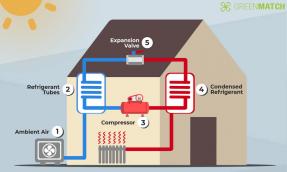
Rate It Green spoke with economist Dr. Gilbert Metcalf of Tufts University about carbon taxes, the Green New Deal, role of the EPA, the current pandemic, border carbon adjustments, and bringing others to the table on climate change. His perspective was enlightening in terms of how to curtail emissions and smoothly transition to a clean energy-based economy.
Dr. Metcalf, Professor of Economics and the John DiBiaggio Professor of Citizenship and Public Service, is the author of Paying for Pollution: Why a Carbon Tax is Good for America (2019). His primary research area is applied public finance with particular interests in taxation, energy, and environmental economics and has taught at Princeton University, the Kennedy School of Government, and MIT.
His current research focuses on policy evaluation and design in the area of energy and climate change and he has published extensively on energy and tax policy. During 2011 and 2012, he served as the Deputy Assistant Secretary for Environment and Energy at the U.S. Department of Treasury. Dr. Metcalf has frequently testified before Congress, served on expert panels including a National Academies of Sciences panel on energy externalities, and served as a consultant to various organizations.
Note: This is a companion piece to The Case for Carbon Tax as a Tool to Cut Carbon Pollution and Create Jobs.
RIG: Tell me a little about when this first became a passion of yours - when this became a concept you wanted to advocate for? Like an “ah-ha” moment.
M: I'm not sure that I had an “ah-ha” moment… It has always been just a fundamentally basic idea that a carbon tax is such a sensible way to approach the problem of emissions. Probably, when I first studied environmental economics and was exposed to the idea of an externality [a side effect or consequence of an industrial or commercial activity that affects other parties without being factored into the cost] and I thought “Oh well it seems like a pretty sensible and obvious way to proceed.”
Started thinking hard about it back in the Clinton administration, in the early nineties I guess. When Clinton proposed a BTU (British thermal units - the energy content of fuels) tax which didn't go anywhere. His idea was to levy a tax on fuel based on its energy content, but the problem is that the carbon emissions of some fuels vary much more than the energy content. So if we're concerned about pollution, then it didn't make any sense to be charging the same tax on coal as natural gas in terms of their energy content since coal generates so much more carbon. We should be charging based on their emissions content and that's what a carbon tax does. It gives Adam Smith’s invisible hand of the market a green thumb.
RIG: For a carbon tax, is there a model the U.S. can follow from another country?
M: Who do we look to as a model for implementing a carbon tax?
RIG: Yes
M: I think we can look at British Columbia - they have a broad based carbon tax and that's really the best model. There are a lot of carbon taxes around the world but none of them are as broad based as British Columbia.
RIG: What about, say, Sweden?
M: Well, Sweden is part of the European Union emission trading system so there’s really only a tax on building, energy consumption and transportation fuels. It really doesn't tax electricity or a lot of other industrial emissions because that stuff is already under the cap and trade system.
RIG: You said British Columbia, as opposed to Canada overall?
M: Well, Canada does not have a national carbon tax. Trudeau has put in place a national carbon price but he's left it to the provinces to determine how they implement that price. So provinces can do it through a carbon tax, they can do it through a cap and trade system or some other equivalent system. But if the provinces don't do it then the national government will step in. I'm not clear on how they would do it - whether they would use a British Columbia style carbon tax or do something else.
RIG: In your work, you mention that bringing Republicans to the table on a carbon tax may not be as difficult as one might expect, the current administration aside. Could you expand on that please?
M: Well, I think there's a couple of things: One is that many traditional Republicans who are pro-small government, pro-market, would much prefer using a market signal to deal with the climate problem rather than heavy handed government regulation. The second is what the trade off would be worth to them - they may think a tax on carbon emissions is preferable to having the EPA regulate what we do in our firms. A lot of businesses would see that as a worthwhile tradeoff.
RIG: Surely you’re not suggesting dismantling the EPA. That might be a little extreme.
M: No, but you could imagine a deal gets cut where the regulation of carbon dioxide and other greenhouse gases under the Clean Air Act is put under a kind of moratorium, so long as a sufficiently ambitious carbon tax is in effect. These kinds of deals have been discussed in Washington and I think there are a lot of Republicans who are promoting this idea.
It's not that we're dismantling EPA - we're always going to need environmental protection, but the EPA would not need to to regulate everything if we've got an alternative way of dealing with the problem.
RIG: Just so I understand, that the Republicans are interested because they prefer taxes to regulations.
M: Given the choice, the approach of a carbon tax has the advantage of being the least heavy handed in dealing with the problem. And the fact that because we’ve gotten a lot better at measuring the financial damage of climate change in recent years - current projections for 2080 to 2099 indicate that the hardest hit areas of the country will be in the South, many of which are traditionally red states.
RIG: What about the individual? Someone who drives a lot for their job - would that be a trickle down from the car companies or with individuals who generate a large carbon footprint with their lifestyle….
M: I mean, if I live in an 8,000 square foot house with six cars, I'm going to pay a lot more in energy prices because of this tax. But I'm not going to be filling out forms sending a check to the government. It's just much easier to collect the tax on the fuel at some point in the production cycle because we know that once that fuel is produced it’s going to get burned. So if we put the tax on an oil refinery, that will raise the price of gasoline and jet fuel and some of that will be passed on to consumers through higher prices.
RIG: Makes sense - and probably more acceptable to sell to the public. But it can still cause a backlash - France tried to do something similar and people still rejected it. How do we avoid our own Yellow Vest protests?
M: There’s a bit more to the story there. The backlash was more the result of poor management than the carbon policy itself. The government had repealed taxes on the wealthy while increasing them for the working class, with very little public engagement, which began fomenting discontent. The carbon tax was the straw that broke the camel's back.
RIG: So a lesson we can take from France is implementation and framing?
M: Exactly.
RIG: Do you think that a carbon tax would hit the building industry particularly hard since so many construction materials imported are so energy intensive? Would they oppose this?
M: Well, I can't speak to whether they would be opponents or not, but I do think it will have to do with how the tax is framed. An important thing to remember - it will create opportunities for innovators and entrepreneurs to come along and come up with less carbon intensive building materials that create new jobs for the construction industry.
RIG: How do you see a U.S. carbon tax fitting into the Green New Deal? What’s your opinion of the Green New Deal?
M: Well, the Green New Deal is really a set of aspirations. There’s no real substantive content to it at this point and I think that’s deliberate, in that it sort of leaves it to the dealmakers in Washington to figure out what that will be. You could certainly argue that carbon tax should be part of the package of the Green New Deal simply because it is the most cost-effective way to reduce emissions. So I would hope it would become part of the package. In terms of spending, whatever we’re going to do, once we’re through the current crisis, we’re going to turn to how we get people back to work and that’s when the opportunity is there for some kind of green infrastructure plans.
RIG: Do you see the current pandemic lending some urgency to the climate change issue or rather just pushing this all further down the line in terms of priorities?
M: I honestly don't know. Certainly, all hands are on deck to prevent us from spiraling into the great depression, and we can’t lose our focus. But at the same time, climate change is not going away so if we’re going to see a lot of massive infrastructure spending as one of the ways to revise the economy, there’s an opportunity to tweak that spending to build low carbon infrastructure moving forward.
RIG: Could you explain a border carbon adjustment and give some examples?
M: So the idea of a border carbon adjustment is that - it’s easy to tax the carbon emissions from fossil fuels that we produce and burn here in the United States and if that's true we should tax the ones that are imported as well. If we import a barrel of oil, we know how much carbon dioxide will be released when it's burned so we can tax that at the border.
When we produce a ton of steel in the United States, we know there are clearly going to be fossil fuel emissions associated with producing that ton of steel and we can tax those. But if we imported that ton of steel, we don't know how much carbon emission there was in producing it.
So there's a fundamental problem - it’s difficult but not impossible to find what are the actual emissions associated with the energy intensive imports. In many imports, we just don't care about the emissions for example, the emissions contained in say, a t-shirt that's imported from Vietnam - they are pretty minimal in comparison to the total value of that T shirt.
So in most things, not a big deal - but there are a few things where it could be because the value of the carbon content and the value of the product can be pretty high. It's those things we want to watch for when conceptualizing a border adjustment so we don't create distortion, where firms have an incentive to offshore their production of steel or cars or aluminum to avoid a carbon tax.
RIG: So we want to strike the balance so that it doesn't scare off manufacturers but also so it still adequately taxes the carbon emissions from the manufacturers, correct?
M: Yes, striking that balance and making sure we do focus on those sectors where levying a carbon tax could lead firms to change where they produce their goods.
There are going to be a few products or a few sectors that are very energy intensive and thus likely to have greater carbon emissions associated with their goods. Some of those sectors are also going to be trade sensitive.
If we think about electricity - we don't import a lot of electricity so there's probably less concern with border adjustments around electricity than with things like steel, cement or aluminum or maybe automobiles and other big ticket capital items.
RIG: Could you give examples of countries where this has been implemented optimally?
M: I can't because no one has really done it even though it’s an idea that gets talked about a lot. But if you look at, say, the European Union has an emissions trading system (based on a cap and trade system) so they don't do border carbon adjustments. China is now also rolling out a national cap and trade system so they're not doing it.
There's two reasons why countries haven't done this so much. One - border carbon adjustments are really hard to put in place. And two - it may not be that important economically. What I mean is if we levied a carbon tax in the United States, some of these firms would start thinking ‘Oh gosh it's going to be more expensive to produce here. But if I go to Europe to produce - well they have an emission trading system and oh, if I go to China to produce they're implementing a cap and trade system.’
RIG: So the idea of border carbon adjustments becomes something of a moot point - since most areas will have some kind of carbon price in place.
M: Yes, it may not be worth the effort to implement.
RIG: Thank you for your time. Your insights on these topics are a great help to others in understanding these concepts.
M: My pleasure.
- Filed Under: Government Policies
- ( 14327 ) views

Master's in Media Innovation from Northeastern University Freelance journalist and blogger
- ( 0 ) Ratings
- ( 0 ) Discussions
- ( 0 ) Group Posts
Reply/Leave a Comment (You must be logged in to leave a comment)
Connect with us!
Subscribe to our monthly newsletter:
 Greenbuild Report Out, 2025 Nov 12, 2025
Greenbuild Report Out, 2025 Nov 12, 2025






























Not a Member Yet? Register and Join the Community | Log in